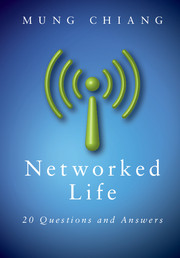Book contents
- Frontmatter
- Contents
- Preface
- Acknowledgements
- Roadmap
- 1 What makes CDMA work for my smartphone?
- 2 How does Google sell ad spaces?
- 3 How does Google rank webpages?
- 4 How does Netflix recommend movies?
- 5 When can I trust an average rating on Amazon?
- 6 Why does Wikipedia even work?
- 7 How do I viralize a YouTube video and tip a Groupon deal?
- 8 How do I influence people on Facebook and Twitter?
- 9 Can I really reach anyone in six steps?
- 10 Does the Internet have an Achilles' heel?
- 11 Why do AT&T and Verizon Wireless charge me $10 a GB?
- 12 How can I pay less for each GB?
- 13 How does traffic get through the Internet?
- 14 Why doesn't the Internet collapse under congestion?
- 15 How can Skype and Bit Torrent be free?
- 16 What's inside the cloud of iCloud?
- 17 IPTV and Netflix: How can the Internet support video?
- 18 Why is WiFi faster at home than at a hotspot?
- 19 Why am I getting only a few % of the advertised 4G speed?
- 20 Is it fair that my neighbor's iPad downloads faster?
- Index
- Notes
20 - Is it fair that my neighbor's iPad downloads faster?
Published online by Cambridge University Press: 05 November 2012
- Frontmatter
- Contents
- Preface
- Acknowledgements
- Roadmap
- 1 What makes CDMA work for my smartphone?
- 2 How does Google sell ad spaces?
- 3 How does Google rank webpages?
- 4 How does Netflix recommend movies?
- 5 When can I trust an average rating on Amazon?
- 6 Why does Wikipedia even work?
- 7 How do I viralize a YouTube video and tip a Groupon deal?
- 8 How do I influence people on Facebook and Twitter?
- 9 Can I really reach anyone in six steps?
- 10 Does the Internet have an Achilles' heel?
- 11 Why do AT&T and Verizon Wireless charge me $10 a GB?
- 12 How can I pay less for each GB?
- 13 How does traffic get through the Internet?
- 14 Why doesn't the Internet collapse under congestion?
- 15 How can Skype and Bit Torrent be free?
- 16 What's inside the cloud of iCloud?
- 17 IPTV and Netflix: How can the Internet support video?
- 18 Why is WiFi faster at home than at a hotspot?
- 19 Why am I getting only a few % of the advertised 4G speed?
- 20 Is it fair that my neighbor's iPad downloads faster?
- Index
- Notes
Summary
We have come to the last chapter, on a sensitive subject that we touched upon many times in the previous chapters and forms an essential part of both social choice theory and technology network design: quantifying fairness of resource allocation. This may sound obvious, but it does not hurt to highlight: the scope of our discussion will be only on performance metrics, not on liberty and rights.
A Short Answer
Thinking about fairness
The naive view of “equality is fairness” is problematic in examining performance metrics of a group of users stemming from some allocation of resources. If you have to choose from an allocation of (1, 1) Mbps between two iPad users, and an allocation of (100, 101) Mbps, many people would choose (100, 101) Mbps even though it deviates from an equal allocation. Magnitude matters. Part of Rawls' theory of justice is the difference principle that we will discuss in the Advanced Material, which prefers a less equal allocation if that means everyone gets more. Of course, a more challenging choice would have been between (1, 1) Mbps and (1, 2) Mbps.
Another objection to marking equal allocations as the most fair stems from the differences in the contributions by, and the needs of, different users. If a user in a social network glues the entire network together, her contribution is higher than that of a “leaf node” user. If one works twice as hard or twice as effectively as another, these two people should not receive identical salaries.
- Type
- Chapter
- Information
- Networked Life20 Questions and Answers, pp. 452 - 472Publisher: Cambridge University PressPrint publication year: 2012



